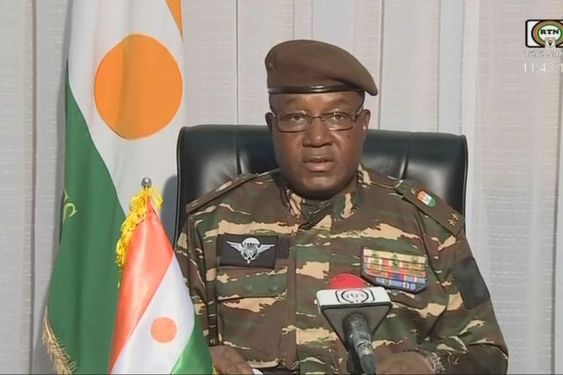Africa
As Nigeria cuts power, Niger’s coup leader remains obstinate, as ECOWAS threatens action

General Abdourahamane Tchiani escalates confrontation with ECOWAS, rejecting any meddling in Niger’s internal affairs.
Niger’s coup leader has announced that he will not bow to demands to return overthrown President Mohamed Bazoum, calling West African leaders’ sanctions “illegal” and “inhumane,” and asking his countrymen to prepare to defend their country.
General Abdourahamane Tchiani’s remarks came in a televised statement on Wednesday, as the Economic Community of West African States (ECOWAS) defence leaders met in neighbouring Nigeria to discuss the Niger problem.
If Bazoum’s president is not restored by August 6, the regional bloc will impose severe economic sanctions on Niger and threaten to deploy force. It has also sent a mission to Niger, led by former Nigerian President Abdulsalami Abubakar, to engage with the military who have taken authority.
Tchiani, on the other hand, was defiant.
The military, according to the self-proclaimed leader, “rejects these sanctions completely and refuses to give in to any threats, wherever they come from.” “We reject any interference in Niger’s internal affairs.”
“As a result, we call on the people of Niger as a whole and their unity to defeat all those who seek to inflict unspeakable suffering on our hardworking populations and destabilise our country,” he said.
Tchiani, who oversees Niger’s presidential guard, went on to say that the “hostile and radical” views of people who oppose his administration contribute no value. ECOWAS sanctions were “illegal, unfair, inhuman, and unprecedented,” he claimed.
The venomous rhetoric deepens Niger’s conflict with the 15-nation ECOWAS, which has been fighting to contain a democratic backslide in West Africa over the last two years. Military takeovers in Mali, Burkina Faso, and Guinea, as well as an attempted coup in Guinea-Bissau, have occurred.
Abdel-Fatau Musah, the ECOWAS Commissioner for Political Affairs, Peace, and Security, told reporters on Wednesday in Abuja, Nigeria, that while the “military option is the very last option on the table,” the bloc must “prepare for the eventuality.”
“There is a need to demonstrate that we can not only bark but also bite,” he stated.
According to official utility data, Nigeria cut power to Niger as part of the sanctions. Niger is one of the world’s poorest countries, relying on Nigeria for 70% of its electricity.
In addition, the World Bank declared that it was withholding disbursements to Niger until further notice, indicating that pressure was increasing on the military.
“The task of restoring democratic governance in Niger is fraught with potential hurdles and complications,” said General Christopher Musa, Nigeria’s chief of defence and chairman of the ECOWAS defence chiefs. “Our decisions will send a strong message about our commitment to democracy, intolerance for unconstitutional government changes, and commitment to regional stability,” he told his regional counterparts.
Despite ECOWAS’ tough stance, military-backed regimes in the region have backed Tchiani, with Mali and Burkina Faso declaring that any foreign intervention in Niger would be deemed a declaration of war on them as well.
General Salifou Mody, one of Niger’s coup leaders, arrived in Mali’s capital Bamako with a team on Wednesday. In an interview carried on Malian state television, he emphasised the need of bilateral collaboration.
In the meantime, Russia, which has increased its influence in Mali and Burkina Faso following coups in those countries, has called for “urgent national dialogue” in Niger. Threats of intervention, the Kremlin cautioned on Wednesday, “will not help ease tensions or calm the domestic situation.”
Western countries, on the other hand, have fiercely criticised the coup in Niger on July 26. Many of them considered Niger as the West’s only solid ally in the war against armed organisations affiliated with al-Qaeda and ISIL (ISIS) in Africa’s Sahel area, and they feared that the country’s instability would allow fighters to gain ground.
In the midst of the tensions, the United States, which has a drone base and troops in Niger, said that some of its workers and families will be evacuated from the country’s embassy. The mission, on the other hand, will stay open, and the top leadership will continue to work there, according to the statement.
European nations like as France, Italy, and Germany have already begun evacuating their citizens, with the first military planes carrying evacuees landing in Paris and Rome on Wednesday.
The French foreign ministry said roughly 1,000 people had been evacuated on four aircraft, with a fifth on the way.
However, no notice of the evacuation of foreign forces has been made.
AL JAZEERA AND NEWSPAPERS
